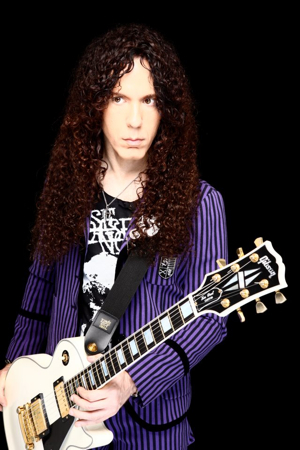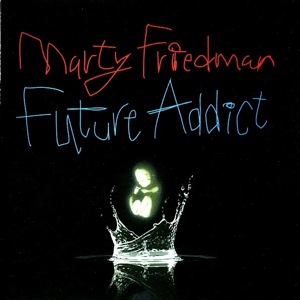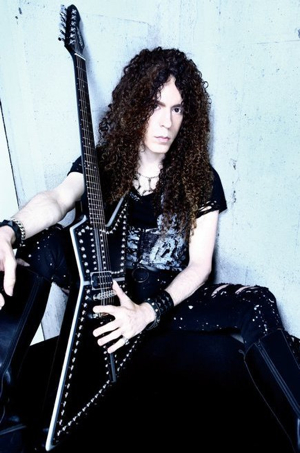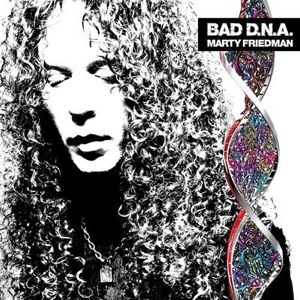By Aniruddh “Andrew” Bansal
Guitar maestro Marty Friedman, known for his exemplary work in Cacophony and Megadeth as well as for his solo work, finally looks all set to release three of his recent solo albums in North America via Prosthetic Records on August 14. “Future Addict” and “Bad D.N.A.” will be released in this territory for the first time ever, while the 2006 Shrapnel records release “Loudspeaker” will see a re-issue. Being the huge Megadeth fan that I am, I’ve always had a fascination towards Marty’s style of playing, and this is an interview I’ve been wanting to do since the day I started this website. I was thrilled to get a chance to do this a couple of days ago, and I got to ask him about this North American release, touring plans, life in Japan, playing technique, and a couple of other things. I think his manner of answering questions is quite reflective of his personality as a musician, and fans will enjoy reading the conversation below. Also check out a song off of “Bad D.N.A.” using the YouTube player embedded near the bottom of this page, and keep an eye on the official Marty Friedman website for info on album orders and tour dates.
First of all, let’s talk about the North American release of three of your albums, out of which “Future Addict” and “Bad D.N.A.” are being released Stateside for the first time ever. Why did it take you so long to decide on a North America release for these albums? Were you just waiting for the right record deal?
As much as I wanted everyone in the US to hear my latest music, I was in no rush to release them just for the sake of releasing them. It had to be done by a company who understands my music and sees potential in it that I might not see myself. The fine people at Prosthetic blew me away with their enthusiasm towards these records, so I was happy to have them do the releases.
 Of late, the general opinion amongst your fans has been, ‘Marty Friedman cares only about his Japanese fan-base. He doesn’t think about other fans anymore’. Do you hope that these releases would finally put an end to this misconception?
Of late, the general opinion amongst your fans has been, ‘Marty Friedman cares only about his Japanese fan-base. He doesn’t think about other fans anymore’. Do you hope that these releases would finally put an end to this misconception?
That would be nice. I have the same amount of love for any fan of my music, wherever they are. When I came to Japan, things went a whole lot better for me than I ever would have expected. I got year-long TV commitments and some big projects so there wound up being no time left over to make the rest of the world a priority anymore. I would make an effort once in a while and do short tours and events outside of Japan, and the fans there were just fantastic. I had an awesome time. Those shows planted the seed for me to seriously do more stuff outside of Japan.
After the release of these albums, are you also planning on touring these territories and playing some shows?
I will tour Europe in October 2012, and I’m planning a US tour for 2013.
What will it be like? Are you going to bring a backing band with you or will it be more like a G3 kind of thing with other solo guitarists?
It will be spectacular, or else there is no reason or inspiration to do it at all. It will be worth the wait.
You’ve worked with various musicians over the years. I don’t mean to put you on the spot here, but whom did you most enjoy working with?
I have enjoyed everyone I`ve worked with a lot. I`ve been lucky. There is no one in my career that I wouldn’t want to see again sometime.
 I interviewed Chris Poland two years ago, and he said, ‘After I was out of Megadeth, Marty Friedman is the only Megadeth guitarist I ever cared about.’ Have you had a chance to interact with Chris in recent years?
I interviewed Chris Poland two years ago, and he said, ‘After I was out of Megadeth, Marty Friedman is the only Megadeth guitarist I ever cared about.’ Have you had a chance to interact with Chris in recent years?
That’s nice of him to say. What we have in common is that we are both strange musos but we both had a certain magic within Megadeth`s framework that just worked. Chris and I toured the US in 2003, along with Alex Skolnick. Chris is a beast of a guitarist, with an immediately identifiable style.
Have you written any material for your next solo album?
I’m watching the drums for it get edited right now as we speak.
If you were to pick guest musicians for the next album or for any of your future endeavors, whom would you ideally want to work with?
There are a lot of younger guys like my friend Keshav Dhar from Skyharbor who I would enjoy working with.
It’s well known that you’re a mainstream musician in Japan. But when you first moved there, how much time did it take you to achieve that level of recognition?
I was very lucky to start touring and recording almost immediately with a J-pop legend, Aikawa Nanase. That opened some doors to a lot of new things musically, but doing TV really took me into the mainstream more than anything. I hadn’t planned on that.
Musicians in metal bands mostly stay away from the mainstream styles of music, but you’re an exception to that, as you are getting to experience the mainstream in Japan. When that first happened, did it change your perception about music and make you relatively open-minded as compared to the average metal guitarist?
If I’m anything at all, I’m open minded, even to a fault, if that is possible. Sometimes in the metal world, people pride themselves on being underground, I get it, and that’s fine, but I’m not like that at all, and I don’t care about any movement. My goal is to make music I love, as best as I can, and to have as many people enjoy it as possible.
 Even though you spent a lot of your time in California to work on Cacophony and Megadeth, and a few years in Hawaii before that, you grew up in Laurel, Maryland. What were those early days like, and how much were you into music and musicianship back then?
Even though you spent a lot of your time in California to work on Cacophony and Megadeth, and a few years in Hawaii before that, you grew up in Laurel, Maryland. What were those early days like, and how much were you into music and musicianship back then?
I never cared about musicianship because I believe musicianship should be taken for granted. I mean, every musician should have plenty of musicianship! Rather, I always cared about the music itself, because making good new music is the goal of those creating it. Musicianship, if you get caught up in the mechanics of it, can wind you up as a teacher and not an artist. This I knew from even the earliest days.
You’ve always been an improviser on the guitar. In recent years, have you incorporated any newer elements into your guitar playing that we might not have heard in the music you did with Cacophony, Megadeth or your earlier bands?
Oh, absolutely, my playing changes constantly and with every single thing I do. My subconscious goal, with anything that I plan to release, has always been to never repeat myself, ever. I’m sure I can’t achieve that 100% of the time, but that concept is a big part of my playing, so naturally my newer stuff will have evolved considerably since when I was in those bands.
Among musicians, you’re also known for a unique playing technique that’s hard to find, and certainly hard to duplicate. Was there a purpose or intention behind the uniqueness in this technique when you started playing guitar? Or was it just a natural thing?
I think my style is unique possibly in part due to the fact that I ignore all the recognized techniques, cliche scale patterns, modes, tricks like tapping and using tremolo bars, common guitar playing trappings. What you have left is only music, the notes that I choose to play. It’s very natural for me, but the idea to play this way probably was born out of sucking at all of those normal guitar things when I first started playing. Everybody in the neighborhood was already good at those things anyway. So where a lot of people put their efforts in being able to play Paganini’s music or Flight of the Bumblebee, or any other practice-intensive piece, I put that kind of effort into understanding why I liked what I liked, and how I could use that information to make my own music.
Lastly, I was at a clinic you did at the Musicians Institute in Hollywood, in January 2009. I thought it was great, and you gave some very cool insights into your musicianship. Do you intend to do any more of those outside of Japan?
Thank you very much. Actually I rarely do those in Japan, but sometimes I do them elsewhere, I enjoy them a lot because I get to meet my fans in person and have a chat with them.
[ Note: If you’re seeing the facebook & twitter share counts as ‘0’ in the plugin below, it’s due to a glitch in the ShareThis plugin. The actual number of shares is a lot higher than zero! ]
